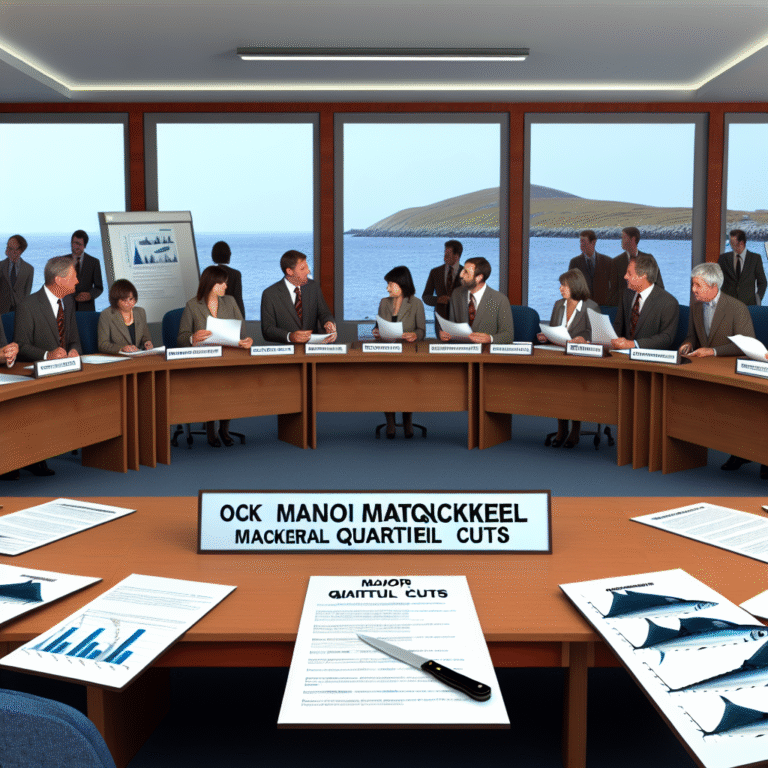Record Mackerel Prices Signal a Troubling Future for North Atlantic Fisheries
The shipping companies of Greenland and other North Atlantic nations have experienced a remarkable fishing season, buoyed by soaring mackerel prices. Yet, in a stark contrast to this temporary boon, marine scientists are issuing a dire warning about the future of this vital fishery.
The International Council for the Exploration of the Sea (ICES) has now proposed a strikingly reduced total mackerel quota of just over 174,000 tonnes for the North-East Atlantic next year. This marks a staggering decrease of nearly 70 percent from the 2025 recommendation of 576,958 tonnes—the lowest quota suggested in years.
A Warning from Marine Biologists
The news is unsettling. ICES biologists are sounding alarm bells, indicating that the mackerel population has dipped below critical biological limits, jeopardizing its ability to regenerate. The quota for Greenland this year stands at 37,500 tonnes and is on the brink of being fully harvested, with five vessels from companies like Polar Seafood and Royal Greenland actively engaged in the fishery.
Should ICES’ recommendations be adopted by Naalakkersuisut (the Greenlandic government), substantial quota reductions will be unavoidable for the upcoming year. For context, Norway’s quota this year was set at 165,000 tonnes, showcasing the gravity of the situation in comparison.
Criticism of Fisheries Management
Professor Teunis Jansen from the Greenland Institute of Nature and DTU Aqua did not hold back in his assessment. With nearly two decades of experience on ICES’s mackerel working group, he emphasized, “For years, mackerel fishing had been a lucrative endeavor for North Atlantic nations. However, poor management of this rich resource has left it at risk—not just for industry, but for society as a whole.”
Historically, Greenlandic vessels have been engaged in mackerel fishing since 2011, initially near East Greenland but more recently venturing into the international waters of the Norwegian Sea. “While the waters off East Greenland still present a viable habitat for mackerel, the dwindling population has been retreating toward its spawning grounds in North-West Europe,” notes Jansen.
In a concerning trend, ICES reports that the mackerel stock has plummeted to under three million tonnes—a marked decline from nearly 14 million tonnes in 2014. This decline has pushed the stock into precarious territory.
The Human Costs of Overfishing
The evidence suggests a pattern of overfishing that cannot be overlooked. Norway and the Faroe Islands are among the largest contributors to the catch, and consensus among fishing nations on quota regulations has been sorely lacking. “Since 2010, we’ve seen 40 percent more than ICES recommends harvested from the North-East Atlantic,” Jansen explains, underscoring the need for unified management.
The implications of ICES’ latest advice are profound—70 percent less than 2025’s recommendation and a staggering 77 percent reduction from expected catches in 2025.
“The rationale behind such a drastic quota cut is hardly surprising,” says Jansen. “Year after year, we’ve witnessed the stock size wane as it continues to be overfished. The juvenile population simply isn’t regenerating as it once did a decade or more ago.”
While Jansen reassures that the mackerel stock is unlikely to face complete extinction, he warns that its current numbers significantly limit its reproductive capacity. “The question becomes how much further can we push this stock down? It is, frankly, reckless to find out.”
Moving forward, the 2026 quota recommendations will guide Naalakkersuisut as they negotiate quotas with other nations fishing in the North-East Atlantic. The Department of Fisheries will draft proposals during the first half of next year, ultimately advising the Greenlandic government on the necessary quota adjustments.
As concerns mount over the sustainability of mackerel stocks, it appears that the bountiful fishing days could soon give way to struggles for preservation. The balance that needs to be struck between economic benefit and ecological health has never felt more urgent.
